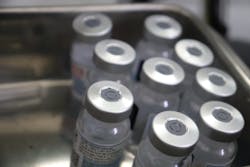The antibodies generated by Pfizer’s COVID-19 vaccine rise more slowly and decline more quickly than those generated by the Moderna vaccine, according to a new study from UVA Health.
The study also finds that older recipients of the Pfizer vaccine generated fewer antibodies than did younger recipients – but this wasn’t the case for Moderna, where age did not appear to be a factor.
The researchers determined that both vaccines generated similar peak levels of COVID-fighting antibodies. This result is at odds with a prior report from the same group that showed antibodies were higher after Moderna, but they say the discrepancy likely can be explained by the faster rate at which the Pfizer antibodies decline. It will be important for future research to consider time frame from vaccination carefully when assessing peak antibody response.
“It is not surprising that antibody levels fall after vaccination,” said Behnam Keshavarz PhD, an Immunologist at the University of Virginia School of Medicine. “But we were struck by how rapidly the antibodies fell after the mRNA vaccines, particularly the Pfizer/BioNTech vaccine.”
Keshavarz and colleagues tracked post-vaccination antibody levels in 234 UVA employees over 10 months. In total, 114 had received Pfizer’s vaccine and 114 had received Moderna’s, while six had received Johnson & Johnson’s single shot.
A week to 20 days after their second dose, recipients of Pfizer’s and Moderna’s mRNA vaccines had antibody levels that were approximately 50 times higher those seen in the J&J recipients. Shortly thereafter antibodies from both Pfizer and Moderna began to drop, but the drop was more precipitous for Pfizer.
After six months, Pfizer vaccine recipients had antibody levels lower than both the Moderna recipients and patients who had been hospitalized with severe COVID-19 six months prior. (Patients who suffer severe COVID are thought to generate more antibodies than people who recover from mild cases.)
The scientists note that while the Pfizer and Moderna vaccines are similar, there are differences in their formulations and the amount of mRNA they contain. This could explain the differences in antibody response they generate. Time between doses also could be a significant factor.
It’s important to understand that antibody levels are a relatively crude tool to assess vaccine effectiveness; doctors aren’t even sure there’s a direct correlation between antibody level and COVID-19 protection. Antibody levels naturally decline, whether after vaccination or illness, but the immune system remembers how to make the necessary antibodies when again confronted by the virus. Time has already told the most important story: All three vaccines examined in UVA’s study have performed remarkably well in protecting against severe illness, hospitalization, and death.
Understanding how antibody levels decline, however, may help doctors and policymakers gauge when booster shots are needed, and who should receive them. For example, the study found that older recipients of Pfizer’s vaccine generated fewer antibodies than did younger recipients. This was true in the first three weeks and confirmed four to six months later. But this wasn’t the case for Moderna recipients – age didn’t appear to have a significant effect. This raises the possibility that booster shots may be of more benefit to older Pfizer recipients than to older Moderna recipients, though this idea would need more study.
The researchers also noticed that there was a trend for men to generate fewer antibodies than did women, but, contrary to a prior report, this was ultimately deemed statistically insignificant.
The scientists note that it remains unclear if the greater antibody response generated by the Moderna vaccine translates into better real-world protection. But the study, they say, may help explain emerging differences in COVID-19 infection rates seen among recipients of the different vaccines.
“Both Pfizer/BioNTech and Moderna have proven very effective in protecting against severe disease, but our study builds on others that have shown some subtle differences in outcomes that favor Moderna,” said senior author Jeffrey Wilson, MD, PhD. “This could particularly be true in higher risk populations, such as older subjects or those who have conditions with suppressed immune systems.”

